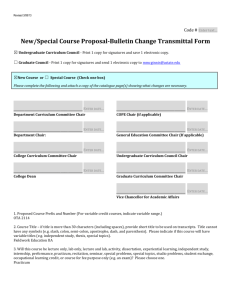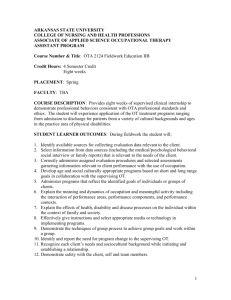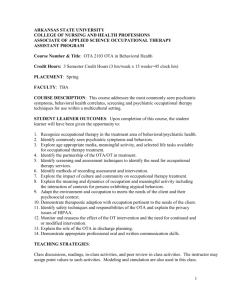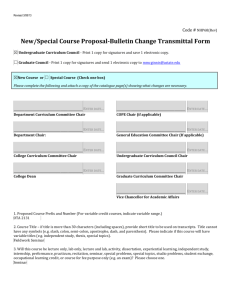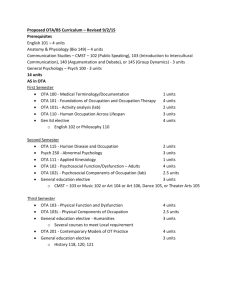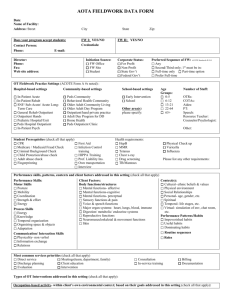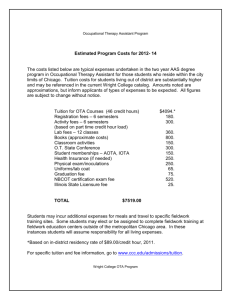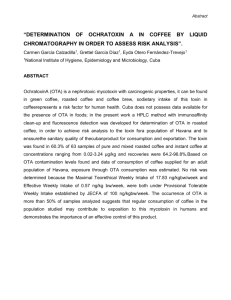1 Philadelphia University Occupational Therapy Assistant Studies
advertisement
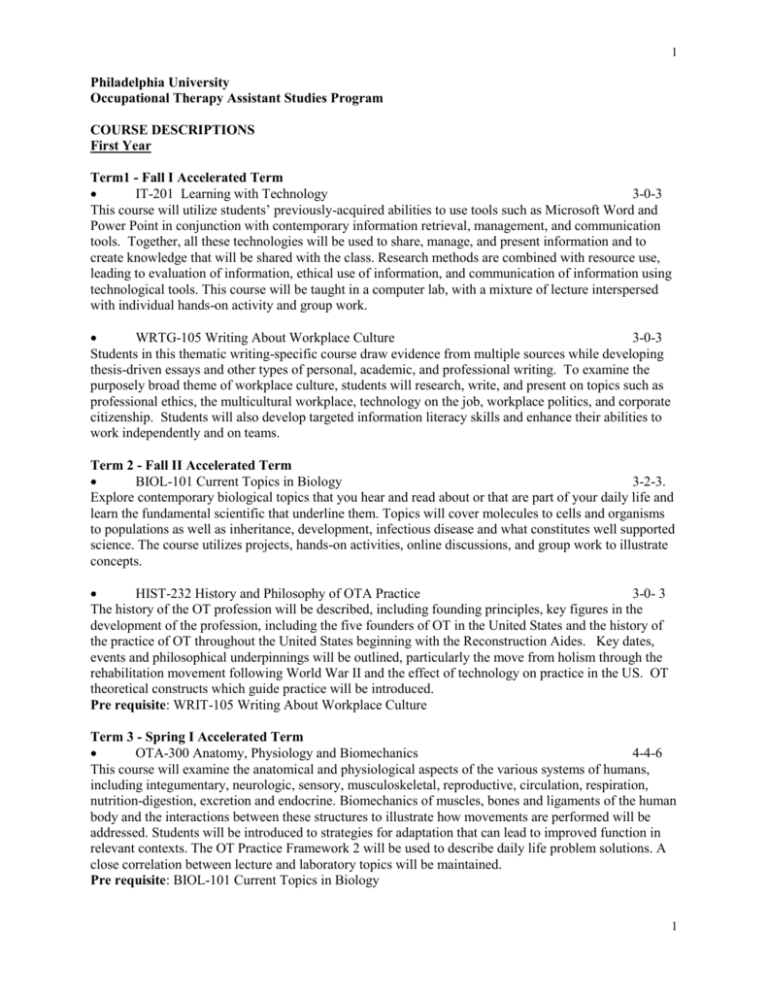
1 Philadelphia University Occupational Therapy Assistant Studies Program COURSE DESCRIPTIONS First Year Term1 - Fall I Accelerated Term IT-201 Learning with Technology 3-0-3 This course will utilize students’ previously-acquired abilities to use tools such as Microsoft Word and Power Point in conjunction with contemporary information retrieval, management, and communication tools. Together, all these technologies will be used to share, manage, and present information and to create knowledge that will be shared with the class. Research methods are combined with resource use, leading to evaluation of information, ethical use of information, and communication of information using technological tools. This course will be taught in a computer lab, with a mixture of lecture interspersed with individual hands-on activity and group work. WRTG-105 Writing About Workplace Culture 3-0-3 Students in this thematic writing-specific course draw evidence from multiple sources while developing thesis-driven essays and other types of personal, academic, and professional writing. To examine the purposely broad theme of workplace culture, students will research, write, and present on topics such as professional ethics, the multicultural workplace, technology on the job, workplace politics, and corporate citizenship. Students will also develop targeted information literacy skills and enhance their abilities to work independently and on teams. Term 2 - Fall II Accelerated Term BIOL-101 Current Topics in Biology 3-2-3. Explore contemporary biological topics that you hear and read about or that are part of your daily life and learn the fundamental scientific that underline them. Topics will cover molecules to cells and organisms to populations as well as inheritance, development, infectious disease and what constitutes well supported science. The course utilizes projects, hands-on activities, online discussions, and group work to illustrate concepts. HIST-232 History and Philosophy of OTA Practice 3-0- 3 The history of the OT profession will be described, including founding principles, key figures in the development of the profession, including the five founders of OT in the United States and the history of the practice of OT throughout the United States beginning with the Reconstruction Aides. Key dates, events and philosophical underpinnings will be outlined, particularly the move from holism through the rehabilitation movement following World War II and the effect of technology on practice in the US. OT theoretical constructs which guide practice will be introduced. Pre requisite: WRIT-105 Writing About Workplace Culture Term 3 - Spring I Accelerated Term OTA-300 Anatomy, Physiology and Biomechanics 4-4-6 This course will examine the anatomical and physiological aspects of the various systems of humans, including integumentary, neurologic, sensory, musculoskeletal, reproductive, circulation, respiration, nutrition-digestion, excretion and endocrine. Biomechanics of muscles, bones and ligaments of the human body and the interactions between these structures to illustrate how movements are performed will be addressed. Students will be introduced to strategies for adaptation that can lead to improved function in relevant contexts. The OT Practice Framework 2 will be used to describe daily life problem solutions. A close correlation between lecture and laboratory topics will be maintained. Pre requisite: BIOL-101 Current Topics in Biology 1 2 PSYCH-101 Introduction to Psychology 3-0-3 Introduction to the methodology, concepts, principles, and issues in the study of behavior. Topics to be covered include: the biological bases of behavior; sensory and perceptual processes; learning, memory and cognition; motivation and emotion; personality, psychopathology, psychological approaches to therapy; and social interactions. This course is a requirement for enrollment in all higher-level psychology courses. Term 4 - Spring II Accelerated Term OTA-302 Occupations Across the Lifespan I: Infancy through Adolescence 3-2-3 The course will focus on the observations, analysis, and performance of human occupations in work, selfcare and play/leisure from infancy through adolescence. The teaching-learning process will be incorporated, with an emphasis on self-directed learning by doing. The OT Practice Framework-2 will be used to describe observations and findings. This course includes an offsite fieldwork component to complement academic teaching content. Pre requisite: HIST-232 History and Philosophy of OTA Practice OTA 306 Conditions I: Infancy through Adolescence 3-2-3 The etiology and symptoms of clinical conditions which are commonly referred to occupational therapy services are examined. The effects of trauma and disease on the biological, psychological, and social domains of occupational behavior are introduced, with particular emphasis on conditions usually experienced from birth through adolescence. Procedures and precautions ensuring safety for patients and caregivers are reviewed. Pre requisites: PSYCH-101 Introduction to Psychology OTA -300 Anatomy, Physiology and Biomechanics Term 5 - Summer Accelerated Term OTA-304 Occupations Across the Lifespan II: Adulthood 3-2-3 The course will focus on the observations, analysis, and performance of human occupations in work, selfcare and play/leisure from late adolescence through elder years. The teaching-learning process will be incorporated, with an emphasis on self-directed learning by doing. Continued focus on learning to use the OT Practice Framework. Pre requisite: OTA-302 Occupations Across the Lifespan I: Infancy through Adolescence OTA 308 Conditions II: Adulthood 3-1-3 The etiology and symptoms of clinical conditions which are commonly referred to occupational therapy services are examined. The effects of trauma and disease on the biological, psychological, and social domains of occupational behavior are introduced, with particular emphasis on conditions usually experienced from early adulthood through aging. Procedures and precautions ensuring safety for patients and caregivers will be reviewed. Pre requisite: OTA 306 Conditions I: Infancy through Adolescence 33 credits-Year I 2 3 Second Year Term 6 - Fall I Accelerated Term OTA 310 Environments and Contexts of Occupation 3-0-3 The context for clients and practitioners can have an enormous effect on the outcome of intervention. This course focuses on environments and effects of access, design and structure on the ability of the person to complete meaningful occupations. Assignments include teaming with students in other disciplines to create adapted solutions for persons with life challenges. Pre requisite: OTA-304 Occupations Across the Lifespan II: Adulthood OTA 410 Interventions I: Infancy through Adolescence 3-3-4 Through analysis and simulation of occupations, the student will gain insight and skill in observation, assessment, documentation, and teaching of adapted self-care, work and play/leisure activities for the person with life challenges from infancy through adolescence. Conditions commonly occurring in this age group will be reviewed, including cerebral palsy, failure to thrive and pervasive developmental disorder. The dynamics of group and individual participation in occupations are explored as they relate to assessment and therapeutic intervention. Pre requisites: OTA-302 Occupations Across the Lifespan I: Infancy through Adolescence OTA 306 Conditions I: Infancy through Adolescence Term 7 - Fall II Accelerated Term OTA 412 Interventions II: Young through Middle Adulthood 3-3-4 Through analysis and simulation of occupations, the student will gain insight and skills in observation, assessment, documentation, and teaching of adaptive self care, work, and play/leisure activities for the person with life challenges from young through middle adulthood. Conditions commonly occurring in this age group will be reviewed including eating disorders, traumatic brain injury, spinal cord injury and schizophrenia. This course includes laboratory and directed offsite fieldwork components to complement lecture content. Prerequisites: OTA 410 Interventions I: Infancy through Adolescence OTA 304 Occupations Across the Lifespan II: Adulthood OTA 308 Conditions II: Adulthood MATH-215 College Algebra 3-0-3 Heavy emphasis will be placed on applications and mathematical modeling immediately useful to students in Continuing and Professional Studies programs. Mathematics topics covered include those in a traditional College Algebra course. Students will gain knowledge and skills in problem solving and modeling using graphing calculators and computer software. Term 8 - Spring I Accelerated Term OTA 414 Interventions III: Late Adulthood 3-3-4 Through analysis and simulation of occupations, the student will gain insight and skills in observation, assessment, documentation, and teaching of adaptive self care, work, and play/leisure activities for the person with life challenges in late adulthood. Conditions commonly occurring in this age group will be reviewed including CVA, arthritis, Alzheimer’s disease, cardiac conditions, and depression. This course includes laboratory and directed offsite fieldwork components to complement lecture content. Pre requisite: OTA 4XX Interventions II: Young through Middle Adulthood 3 4 OTA 400 Leadership and Human Service Systems 3-0-3 Basic management skills and abilities required as a COTA in occupational therapy and other programs will be defined and analyzed. The student will explore topics associated with health care delivery systems, including contextual factors, federal and state regulations, reimbursement systems, and credentialing laws. Skills in management will be reviewed, including organizing and maintaining workload, marketing services, documentation in its various forms, supervision of aides and developing skills as a fieldwork educator. Ethical and professional principles will be defined in the context of a variety of employment and interventions settings, with an emphasis on applying AOTA’s Code of Ethics to different situations. Pre requisite: OTA-232 History and Philosophy of OTA Practice Term 9 - Spring II Accelerated Term OTA 406 Fieldwork II A 2-6-6 Minimum eight weeks and 300 hours supervised experience. Students apply and integrate didactic knowledge and skills with clients in a variety of settings under the supervision of a registered and licensed occupational therapist. Students are assigned to facility and community settings and receive practical experience applying knowledge and skills with individuals of varying ages and conditions. Prior to enrolling, students must successfully complete all required OTA courses, demonstrate current CPR certification, and receive departmental approval. Co-requisite: OTA 402 Ethics and Critical Thinking I Prerequisites: IT 201, OTA 310, MATH 215, OTA 400, OTA 4XX – Interventions III: Late Adulthood. OTA 402 Ethics and Critical Thinking I 2-0-2 Students will review the AOTA Code of Ethics in relation to case studies and examples from fieldwork to further understanding of liability issues, ethical dilemmas, and decision-making in professional interactions, client interventions and employment settings within the context of the OT Practice Framework. Co requisite: OTA 406 Fieldwork II A Term 10 - Summer Accelerated Term OTA 408 Fieldwork II B 2-6-6 Minimum eight weeks and 300 hours supervised experience. Students apply and integrate didactic knowledge and skills with clients in a variety of settings under the supervision of a registered and licensed occupational therapist. Students are assigned to facility and community settings and receive practical experience applying knowledge and skills with individuals of varying ages and conditions. Prior to enrolling, students must successfully complete all required OTA courses, demonstrate current CPR certification, and receive departmental approval. Co-requisite: OTA 404 Ethics and Critical Thinking II Prerequisites: OTA 406 Fieldwork Level II A OTA 404 Ethics and Critical Thinking II 1-0-1 Clinical reasoning, ethical principles, and understanding the values of the profession are defined. The student will discuss and describe value of local, state and national professional OT organizations, the importance of promoting the profession and developing a personal professional development plan, and recognizing personal strengths and areas for improvement. Co requisite: OTA 408 Fieldwork II B 36 credits-Year II Total credits: 69 4

